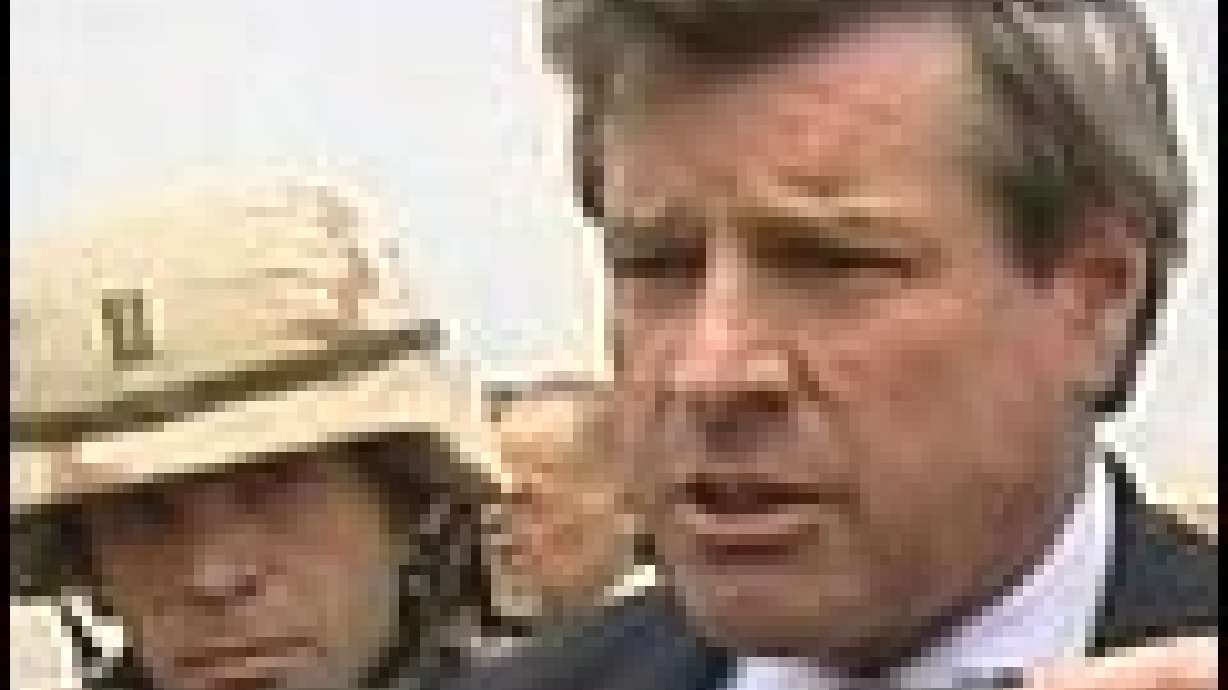Estimated read time: 4-5 minutes
This archived news story is available only for your personal, non-commercial use. Information in the story may be outdated or superseded by additional information. Reading or replaying the story in its archived form does not constitute a republication of the story.
BAGHDAD, Iraq (AP) -- The top U.S. administrator in Iraq, L. Paul Bremer, warned Friday that attacks against coalition forces will likely escalate over the next few months as the occupation authority prepares for a transfer of sovereignty to a new Iraqi government.
The warning came after a roadside bomb hit a U.S. military convoy in Baghdad, killing one soldier, the military said. Two Iraqi civilians also died and 13 were injured, hospital workers said.
Also Friday, President Bush named longtime family troubleshooter, former Secretary of State James A. Baker III, to oversee the job of getting Iraq out from under its crushing $125 billion debt.
"Secretary Baker will report directly to me and will lead an effort to work with the world's governments at the highest levels, with international organizations and with the Iraqis in seeking the restructuring and reduction of Iraq's official debt," Bush said in a statement read by White House press secretary Scott McClellan.
As the president's personal envoy on the issue, Baker will tackle a major problem in the rebuilding of Iraq. Iraq's debt carries annual servicing charges of $7 billion to $8 billion.
"The regime of Saddam Hussein saddled the Iraqi people with the debt because they were more interested in building palaces and torture chambers and mass graves than helping the Iraqi people," McClellan said.
Bush said he made the appointment in response to a request by the Iraqi Governing Council.
On Saturday, Defense Secretary Donald H. Rumsfeld was scheduled to visit American troops in Iraq. He is on a tour of nations in Central Asia, the Middle East and Azerbaijan, Afghanistan and Georgia.
In an interview with The Associated Press, Bremer said former members of Saddam Hussein's intelligence agencies were now assuming an increasingly prominent role in the insurgency. He predicted an upsurge in attacks in coming months.
"In the immediate phase ahead of us between now and the end of June we will actually see an increase in attacks, because the people who are against us now realize that there's huge momentum behind both the economic and political reconstruction of this country," Bremer told the AP.
According to a Nov. 15 agreement between the U.S.-led coalition and Iraq's Governing Council, caucuses will be held across Iraq to elect delegates who will convene by the end of May. One month later, the delegates will elect a transitional government with full sovereign powers, formally ending the U.S.-led occupation.
"The dead-enders can see that all this, plus the fact that the Iraqi people will get their sovereignty back, spells trouble for them," Bremer said. "So I think we will see a phase now when we will actually see increased attacks."
A total of 79 U.S. soldiers died in Iraq in November. Twenty-five other allied troops also were killed, making it the deadliest month for the coalition since the invasion of Iraq on March 20.
The military said that on Friday a roadside bomb killed a soldier who was traveling in a three-vehicle convoy near the al-Samarrai mosque in the New Baghdad section of town.
Two civilians -- a man and a woman -- also died, said Karim Abdullah Muslim, the head of emergency services at the nearby al-Kindi hospital.
Most of the civilian casualties were passengers on a bus that was badly damaged in the explosion, witnesses said.
Haitham Rashid, a passenger on the bus, said about two dozen people were aboard the vehicle at the time of the blast.
Haidar Aziz Kazim, an 11-year-old schoolboy, said he had been shopping with his mother and aunt when the explosion occurred.
"I blame Saddam Hussein for what happened," said Kazim, who was in the hospital with wounds to his legs. "They are hurting ordinary Iraqis, not the Americans."
In a Friday sermon in the town of Kufa south of Baghdad, radical Shiite cleric Muqtada al-Sadr threatened to call a general strike in the holy city of Najaf if U.S. occupation forces do not free members of his militia group by the start of the next Arabic month which falls in about 20 days.
Al-Sadr did not say how many militiamen of the group -- known as Imam al-Mahdi's Army -- were in detention.
His call came two days after Amar Yassiri, whom the U.S. military has described as a senior al-Sadr aide in Baghdad, was detained by U.S. troops in Baghdad in connection with his alleged part in an Oct. 12 ambush in which two soldiers died.
(Copyright 2003 by The Associated Press. All Rights Reserved.)








